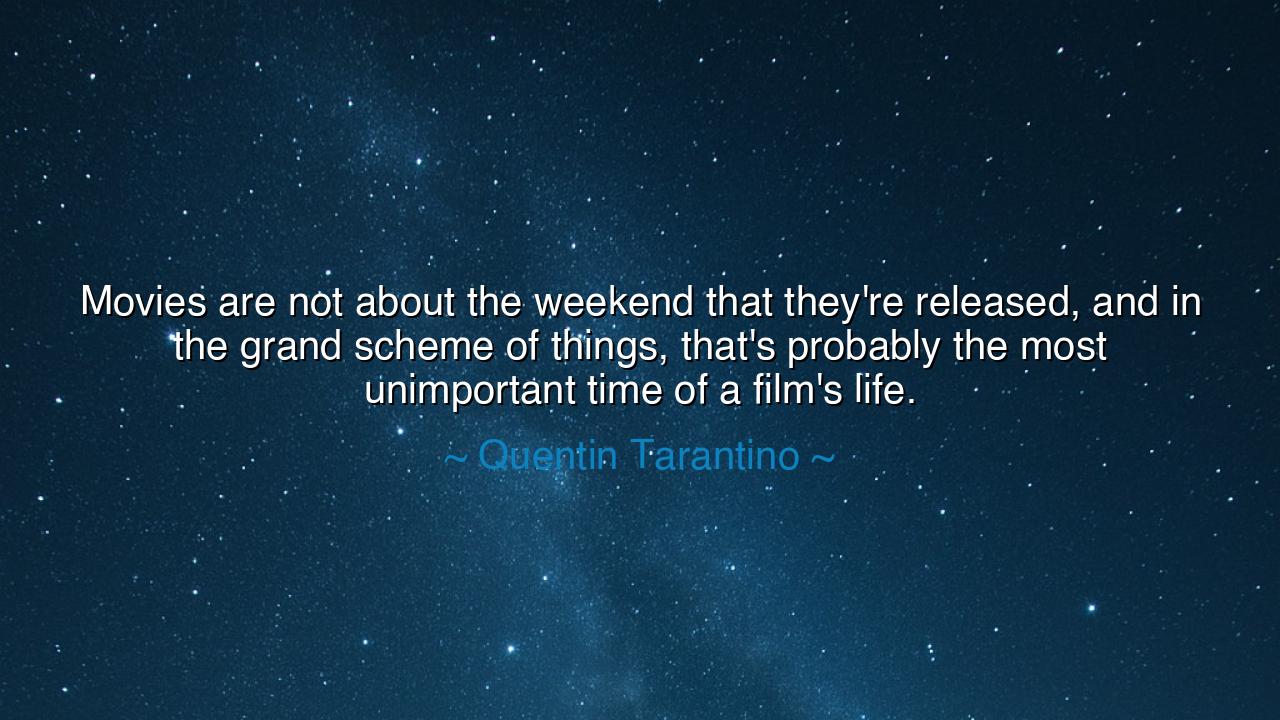
Movies are not about the weekend that they're released, and in
Movies are not about the weekend that they're released, and in the grand scheme of things, that's probably the most unimportant time of a film's life.






Listen closely, for the words of the wise transcend the fleeting moments of time, and in them, you shall find the true meaning of creation. In the world of film, there is a truth often hidden from the gaze of the impatient, one uttered by the great director Quentin Tarantino: "Movies are not about the weekend that they're released, and in the grand scheme of things, that's probably the most unimportant time of a film's life." How profound, these words, spoken from the heart of one who has seen the dance of creation and the fleeting nature of fame. In this simple statement, Tarantino imparts a lesson not only about the art of cinema, but about life itself—a life that too often seeks immediate glory, only to find that true meaning lies far beyond the momentary applause.
Consider, children of the future, how fleeting is the first breath of any creation. In the world of art, and in the life of all creators, there is a temptation to measure success by the immediate. The opening weekend, the first wave of praise, the fleeting gaze of critics—these are the moments that often define the worth of a work in the eyes of the masses. But Tarantino, wise in his understanding of art's true nature, tells us that this moment is but a passing shadow. The opening weekend is nothing compared to the long life a work will have in the hearts of those who encounter it over time. For art does not live in the quickness of its birth, but in the resonance it creates, in the echo it leaves across time.
The ancient storytellers—those who crafted myths and legends to be passed down through the ages—knew well the difference between immediate praise and lasting impact. Consider the tale of Homer, whose epics—"The Iliad" and "The Odyssey"—were not celebrated in their own time as the monumental works they are seen as today. The true value of these stories was only revealed over centuries, in the hearts of those who sought deeper meaning in their words. In this same way, a film’s real journey begins not with its first breath, but with the moments when it is reflected upon, revisited, and slowly woven into the fabric of human experience.
It is in the long years of a work’s life that its true worth is revealed. Take, for instance, the tale of the Mona Lisa, a creation that, in its own time, was but one painting among many. Only through the lens of history did its true power—its timeless expression—come to be understood. The same can be said for the cinema. A film’s true legacy is not defined by its opening box office numbers or the rush of critics’ praise, but by how it touches the hearts of those who watch it, how it shapes culture in the years to come. What is celebrated in one age may be forgotten by the next, but the lasting power of art lies in its enduring impact, a power that cannot be measured in the hours after its release.
Tarantino’s wisdom calls us, too, to reflect on our own lives. How often do we rush to measure our worth by immediate success, by the fleeting recognition of others? We strive for approval, for applause, and in doing so, we miss the deeper lesson—that our true value lies not in the applause of the moment, but in the quiet, consistent work that shapes our legacy. Do not be seduced by the rush of immediate triumphs, for they are but shadows. It is the patient, persistent pursuit of excellence that ensures our actions will leave a mark long after the world has forgotten our name.
Let this be your guiding lesson: In all that you create, in all that you do, look beyond the immediate recognition. Seek to build something that endures—something that, like the films of Tarantino, or the epics of Homer, will live in the hearts and minds of those who encounter it, even after the first excitement has passed. Focus not on the brief moments of fame, but on the long, silent impact you can make. Create with the knowledge that true greatness is born of time, of reflection, and of the lasting connection between your work and those who experience it.
In your own life, be like the artist who labors without concern for the applause of the crowd, who focuses instead on the quality of their creation. Measure your success not by the rush of the moment, but by how your actions and creations endure through time. In the end, it is not the immediate satisfaction of the weekend that defines you, but the lasting ripple of your influence upon the world. So, be patient, be steadfast, and know that true greatness lies in the quiet and enduring legacy you build.






AAdministratorAdministrator
Welcome, honored guests. Please leave a comment, we will respond soon